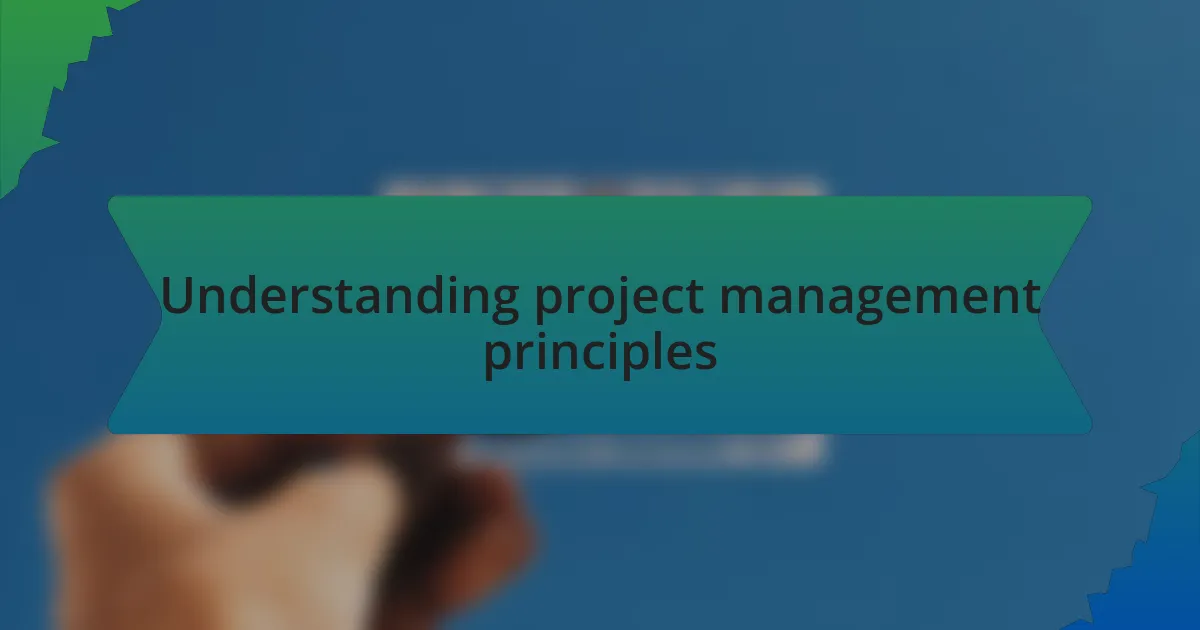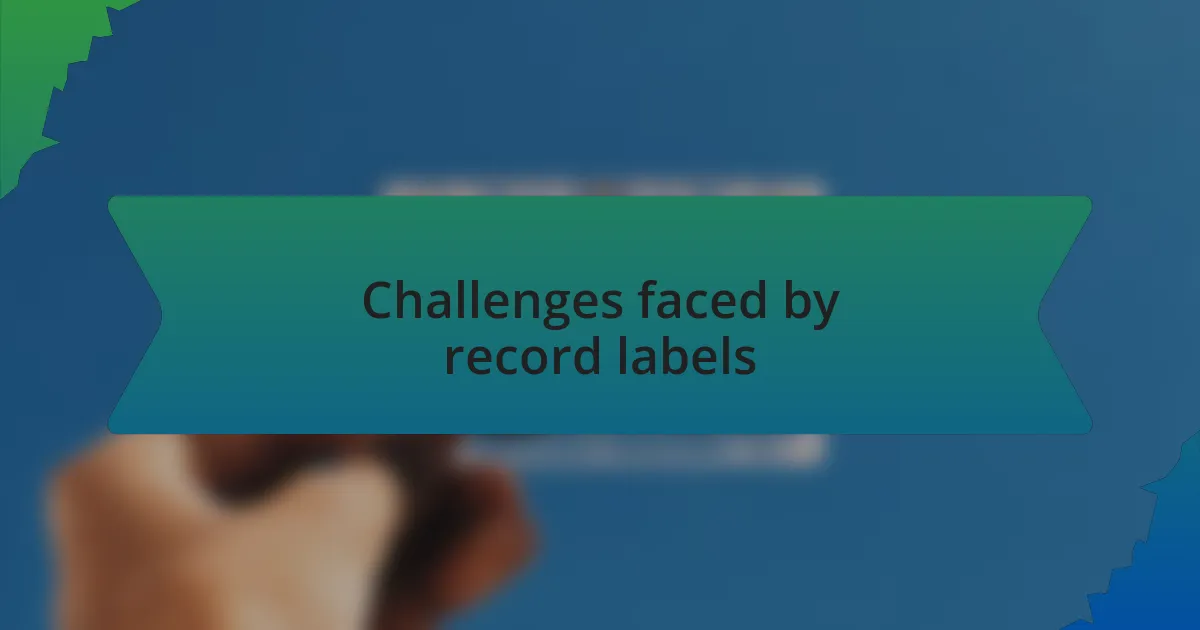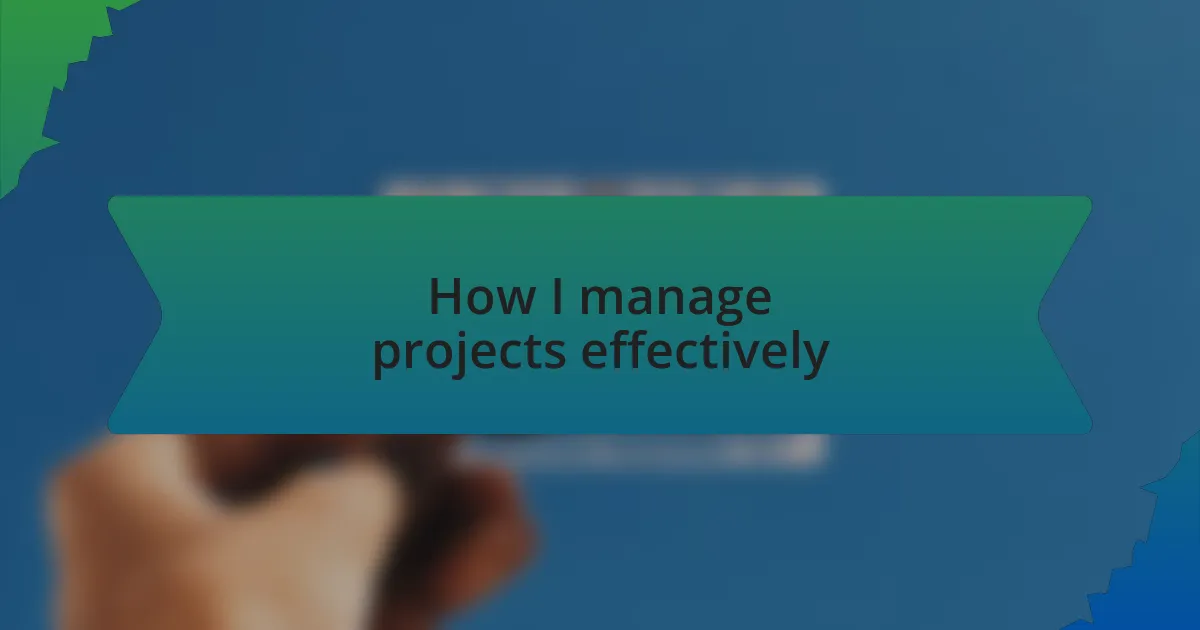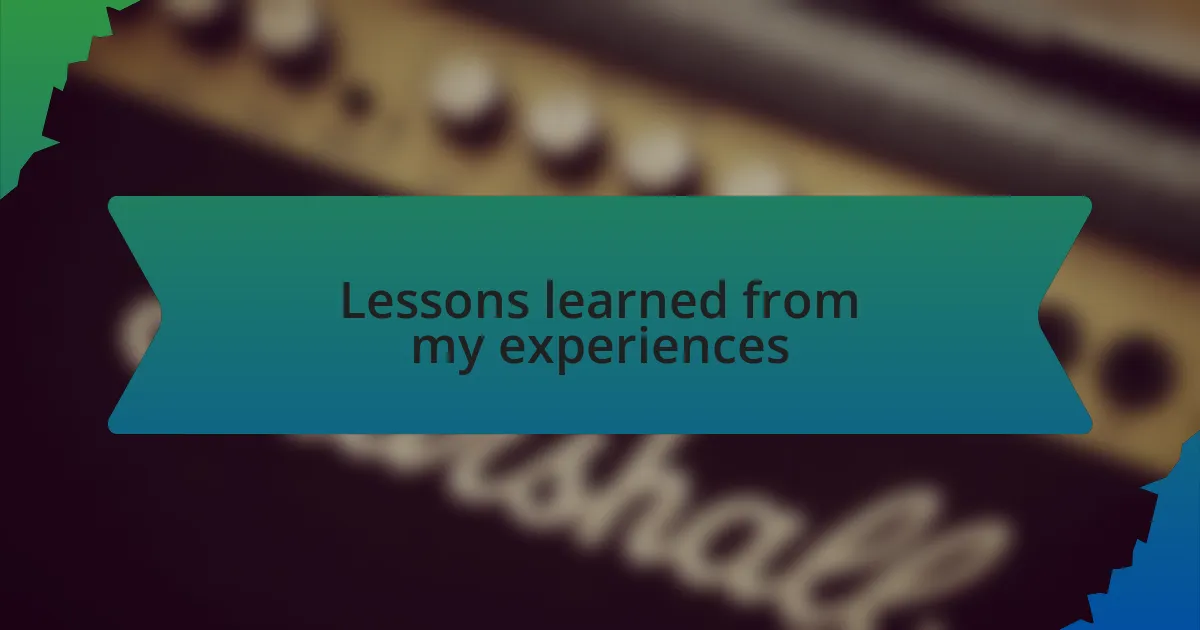Key takeaways:
- Effective project management relies on clear communication, adaptability, and realistic timelines to navigate challenges and foster collaboration.
- Record labels face unique challenges balancing artistic integrity with commercial demands, along with the pressures of the digital landscape.
- Prioritization and flexibility in managing tasks and timelines can lead to innovative outcomes and better project management.
- Post-project reflections enhance team collaboration and create a culture of continuous improvement and learning.

Understanding project management principles
Project management principles are the backbone of successfully navigating any endeavor. I remember a time when I was managing a project for a local band’s album release. I relied heavily on planning and organization, which are fundamental components of project management. Without these principles, I doubt we would have met our tight deadlines.
One of the key principles is effective communication. I’ve often seen projects derail simply due to miscommunication. For instance, during a previous project, I realized that clarifying roles early on helped avoid confusion later, which reinforced my belief that transparency and frequent updates foster trust and collaboration among team members.
Then there’s the importance of adaptability. In the fast-paced environment of a record label, swinging from one creative idea to another can be exhilarating but challenging. I learned that being open to change, while sticking to our core objectives, allows the project to evolve authentically while still staying on track. Have you experienced a moment where an unexpected shift led to a more innovative outcome? Those moments are often where the magic happens.

Challenges faced by record labels
Every record label encounters unique challenges, often centered around balancing artistic vision with commercial viability. I recall a situation where we had a fantastic artist with a clear creative direction, but the market’s demand for radio-friendly tracks posed a dilemma. This tension between staying true to an artist’s identity and meeting audience expectations can be a tough balancing act that not every label navigates successfully.
Another challenge is the digital landscape’s rapid evolution, which constantly alters how music is distributed and consumed. I’ve witnessed firsthand how adapting to streaming platforms required us to rethink marketing strategies entirely. The challenge isn’t just in keeping up but in finding ways to stand out in an oversaturated market where countless new releases flood listeners daily.
Financial constraints also loom large for many labels, especially smaller, independent ones. I remember analyzing budgets for an upcoming tour—scrutinizing every expense while still wanting to create an unforgettable experience for fans. It’s an ongoing struggle to secure funding while ensuring profitability, which often leads to hard decisions about which projects to back. How do you prioritize passion projects when the numbers don’t add up? It’s a question that lingers in the minds of many dedicated music professionals.

How I manage projects effectively
When it comes to managing projects effectively, I rely heavily on clear communication. There was a time when I was overseeing a multi-artist showcase, and without regular check-ins with each artist and the production team, I sensed chaos brewing. By encouraging open lines of dialogue, I not only kept everyone aligned but also fostered a supportive atmosphere where issues could be addressed before they escalated.
Another key strategy for me is prioritization. I remember a project where I had to juggle studio time, promotional efforts, and budget constraints all at once. I learned that listing tasks by urgency and importance made a world of difference. It’s fascinating how a simple to-do list can transform an overwhelming array of tasks into manageable steps. Have you ever tried it? You might be surprised by how much clarity it brings.
Lastly, I find that embracing flexibility is crucial in project management. I recall a situation where an unexpected opportunity arose—a last-minute collaboration with a popular artist. Rather than sticking rigidly to the original plan, I quickly adapted, reshuffling timelines and resources. This experience taught me that being open to change can lead to exciting developments, often more rewarding than the initial vision. What twists have you navigated in your projects?

Lessons learned from my experiences
Lessons learned from my experiences
One of the most significant lessons I’ve learned is the importance of setting realistic timelines. Early in my career, I was overly ambitious with deadlines, believing that pushing team members would yield faster results. However, pushing too hard only led to burnout and diminished creativity. Reflecting on that time, I now prioritize establishing timelines that are challenging yet achievable. Have you ever misjudged a deadline? It can reshape the team dynamic and ultimately affect the project’s success.
Emotional intelligence has proven invaluable throughout my journey in project management. There was a period when tensions ran high during a critical project phase. Instead of pressing through, I took the time to understand my team’s feelings and concerns. By facilitating an open dialogue, I was able to identify underlying issues and restore morale. This experience taught me that acknowledging emotions fosters a healthier work environment. Have you ever noticed how addressing feelings can shift the course of a project?
Another insight that stands out is the power of post-project reflections. After wrapping up a major album release, I began holding review sessions with my team. Here, we discussed what worked, what didn’t, and how we could improve in the future. This simple practice not only strengthens our collaboration but also builds a culture of continuous learning. Has reflecting on past projects helped you grow in your work? It is remarkable how much we can learn when we take the time to analyze our experiences.